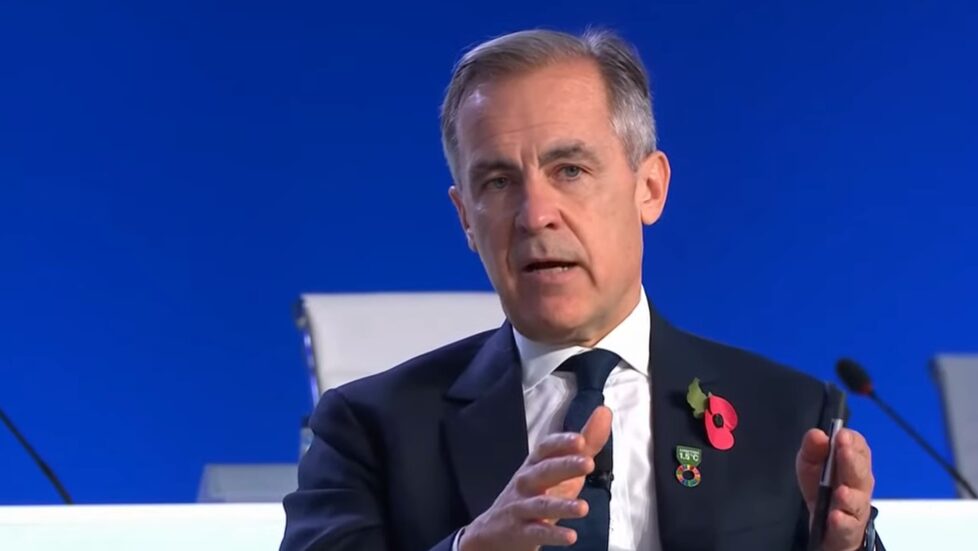Mark Carney-led GFANZ Drops Requirement for Race to Zero Commitment for Members

The Glasgow Financial Alliance for Net Zero (GFANZ), a UN-backed climate-focused multi-trillion dollar coalition of financial institutions, revealed today that it will no longer require its signatories to commit to the UN’s climate action campaign, Race to Zero.
Launched in April 2021, GFANZ brings together several leading net zero groups representing sectors across the financial industry including asset owners and managers, banks, insurers, investment consultants, service providers and investors. The initiative grew rapidly, reaching more than 450 member firms around the world, representing over $130 trillion in assets by COP26 in November 2021. GFANZ announced yesterday in its annual progress report that its membership has now grown to more than 550 members.
GFANZ is co-chaired by former Bank of England and Bank of Canada Governor Mark Carney, and Bloomberg LP founder Michael Bloomberg. The group includes the Net Zero Asset Managers initiative (NZAM), the Net Zero Asset Owner Alliance (NZAOA), the Net Zero Banking Alliance (NZBA), the Net Zero Financial Service Providers Alliance (NZFSPA), the Net Zero Insurance Alliance (NZIA), the Net Zero Investment Consultants Initiative (NZICI), and the Paris Aligned Asset Owners (PAAO).
One of the key criteria for institutions signing on to one of the GFANZ alliances was a commitment to meet the minimum criteria for the Race to Zero. Launched in 2020, Race to Zero is a global campaign designed to rally leadership and support from businesses, cities, regions, and investors committed to cutting global emissions in half by 2030 and achieving net zero by 2050, established under the stewardship of the UNFCCC.
Race to Zero alignment include a strict set of requirements, including pledging to reach net zero by 2050 and an interim 2030 target, explaining the actions necessary to achieve the goals, and committing to report on progress against the targets, among others.
Earlier this year, Race to Zero tightened its criteria for members, adding a requirement to publish a transition plan within 12 months of joining the campaign, as well as a commitment to reach net zero across all emissions scopes. The “all emissions scopes” requirement included financed and portfolio emissions for financial institutions. The requirements also restricted members’ development and financing of new fossil fuel assets.
Additionally, the new criteria also required signatories to align lobbying and advocacy activities with net zero by proactively supporting campaign-consistent climate policies at the subnational and national level.
In a statement provided to ESGEnvironmental, social, and governance (ESG) criteria are a set of standards for a company’s operations that socially conscious investors use to screen potential investments. More Today, a GFANZ spokesperson said that GFANZ members will now be “encouraged, but not required, to partner with the Race to Zero.” The spokesperson added:
“GFANZ and the sector-specific alliances will continue to note the advice and guidance from Race to Zero, as well as other international bodies, such as the UNFCCC, IPCC, IEA, the G20’s Financial Stability Board, and the UN’s High Level Expert Group on net zero.”
The strict Race to Zero criteria reportedly threatened many GFANZ’s members’ ability to remain in the group, either due to restrictions to their ability to finance fossil fuel companies as energy security concerns over the past few months have caused threats of shortages and price spikes, as well as potential legal issues, with concerns that the lobbying requirements or fossil fuel-related criteria could conflict with institutions’ fiduciary duties. One of the key claims made by several U.S. Attorneys’ General in a letter to BlackRock, which sits on the GFANZ steering committee, was that the firm’s commitment to the initiative were not aligned with its fiduciary role.
The GFANZ spokesperson noted that the changes “will help ensure GFANZ’s recommendations reflect regional contexts, and the supervisory, regulatory, and legal obligations unique to the financial sector, as we continue to support net-zero implementation. Implementation is a critical step that requires a broad range of guidance and expertise from finance, science, academia, business, the official sector, and civil society.”
Sustainable finance and investing advocacy groups expressed concern about the announcement. In a statement following the GFANZ move, responsible investment research and campaigning NGO ShareAction’s Head of Banking, Jeanne Martin, said:
“We are extremely concerned by the Glasgow Financial Alliance for Net-Zero’s decision to drop the UN-backed Race to Zero’s science-based guidelines. This comes at a crunch point for the planet – the IEA and UN agencies are calling for an immediate, rapid decline in fossil fuel supply and consumption to have any chance of preventing the worst impacts of climate change.
“Financial institutions have a vital role to play in powering our transition to a low carbon world, and we urge the sub-alliances and members to live up to their responsibilities to support the phasing out of fossil fuels in line with a 1.5C aligned pathway.”
The post Mark Carney-led GFANZ Drops Requirement for Race to Zero Commitment for Members appeared first on ESG Today.